17th Nov 2025 13:44
2024/25
Environmental, Social and Governance (ESG) Report
Welcome to Beyond Housing's environmental, social and governance report
In 2021, Beyond Housing implemented a sustainable bond framework which set out our social and environmental objectives for delivery within our 2020-2025 business strategy.
The framework included a commitment to adopt the Sustainability Reporting Standards (SRS) which align with the United Nations' (UN) Sustainable Development Goals (SDGs) and provides a standardised way of reporting ESG performance in a transparent, consistent, and comparable way.
Each of the three themes has several sub-categories:
Climate change Ecology Resource management | Affordability and security Building safety and quality Resident voice Resident safety Placemaking | Structure and governance Board of trustees Colleague wellbeing Supply chain management |
About Beyond Housing
Beyond Housing is a registered social housing provider, established in 2018 to provide homes and services to customers and communities across Tees Valley and North Yorkshire. We provide just over 15,000 homes and a range of services to over 30,000 customers. We are one of the largest landlords in the Northeast and North Yorkshire, covering a geographical footprint of over 400 square miles. With circa 755 colleagues we recognise our role in society is one that is much bigger than bricks and mortar. We can raise aspirations, invest in our communities, and provide support to people who need it.
Our purpose - why we exist
To help our customers and communities succeed and thrive.
Our mission - how we deliver our purpose
By providing homes customers want, places they are proud of, services they value, delivered by people who care.
Our business model and sustainability impact
We provide housing management, improvement, repair, care and support services, customer empowerment and community development to a diverse customer base and have a bold vision for the future, offering enormous opportunity, as outlined in the Beyond Housing Strategy 2020-2025.
By 2025 we are set to achieve four ambitious objectives for our services, homes, places, and people:
Provide quality services to our customers
· Increase customer satisfaction, grow our independent living business, and have 65% of our customers using digital services.
Build new homes and keep our existing homes in good condition
· Build circa 2,750 new homes, increase customer satisfaction with the quality of our homes and repairs satisfaction and improve the Energy Performance Certificate (EPC) ratings for all our homes to EPC C or better by 2030.
Invest in our communities/neighbourhoods to create a great place to live and work
· Offer the best information and advice to customers, be a leading training provider and create neighbourhoods our customers are proud of.
A great place to work for our people
· Achieve Investors in People (IIP) accreditation, deliver an agile working environment, increase colleague satisfaction, and improve the health and wellbeing of colleagues.
We are committed to sustainability and genuinely care about the work we do to transform the lives of our customers. We pride ourselves in adding social value to our communities, delivering a wide range of services that support and enhance people's quality of life.
We work towards improving the economic, social, and environmental wellbeing of the people living in communities. These benefits cover a wide range of activities, including the creation of apprenticeships and jobs, sub-contracting to local social enterprises, and working with customers and residents to create new and improved community spaces.
Social value is incredibly important to us and is a crucial factor in the way we conduct our business. These benefits cover a wide range of activities, including the creation of apprenticeships and jobs, sub-contracting to local social enterprises, or simply working with residents to create a community garden.
Sustainable bond - financing our ambition
The sustainable bond framework supported Beyond Housing to refinance the business in May 2021 securing the first long-dated (>20-year) sustainable bond in the housing sector.
The finance raised from the bond enables us to invest in existing properties, providing more energy-efficient homes, and helping us move to become a carbon-zero organisation. In addition, it will help us deliver our ambitious development programme, providing value for money and securing the company's long-term plans and will enable us to be front and centre in contributing to the levelling-up agenda and providing quality homes and neighbourhoods as our area goes from strength to strength.
ENVIRONMENTAL
THEME 1: CLIMATE CHANGE
Criteria 1. Distribution of EPC rating of existing homes
2024/25 | 0.3% | 7.5% | 78.4% | 12.3% | 1.5% | 100% |
2023/24 | 0.4% | 5.3% | 80.7% | 12.9% | 0.7% | 100% |
2022/23 | 0.4% | 5.0% | 80.7% | 12.9% | 1.0% | 100% |
2021/22 | 0.0% | 3.2% | 80.7% | 14.4% | 1.7% | 100% |
2020/21 | 0.0% | 3.1% | 74.9% | 19.9% | 2.1% | 100% |
84.6% of our housing stock has achieved an energy efficiency rating of EPC C or above. The average SAP rating is 72.4 and we will meet the Government's target of 100% EPC C or above by 2030.
New build homes will work towards the Future Homes Standard, which aims to produce 75-80% fewer carbon emissions than those built under the 2013 building regulations. Homes will require an EPC rating of A or B, and high performance fabrics will be required together with low carbon heating and heat recovery systems.
Criteria 2. Distribution of EPC ratings of new homes (those completed in the last financial year).
2024/25 | 247 | B | 100% |
2023/24 | 195 | B | 100% |
2022/23 | 142 | B | 100% |
2021/22 | 130 | B | 100% |
2020/21 | 76 | B | 100% |
Criteria 3. Does the housing provider have a Net Zero target and strategy? If so, what is it and when does the housing provider intend to be Net Zero by?
We are committed to achieving the 2050 Net Zero target mandated by the Climate Change Act. As a housing provider, our carbon emissions stem primarily from our housing portfolio and business operations.
Our housing stock is on track to become 'zero-carbon ready' by 2035. This includes upgrading homes to EPC rating C by 2030, aligning with sector targets. These improvements will enhance energy efficiency, reduce heating demands, and lower carbon emissions from our least efficient properties while improving tenant comfort. A phased rollout of low-carbon heating systems will follow, timed to coincide with the replacement of existing gas boilers.
We acknowledge falling short of our 20% carbon reduction target for 2020. To enhance accuracy, we have refined our data analysis and will set a new baseline and target for the next five years (2026-2030).
Criteria 4. What retrofit activities has the housing provider undertaken in the last 12 months in relation to its housing stock? How do these activities align with, and contribute towards, performance against the housing provider's Net Zero strategy and target?
We continued our energy efficiency programme of works, installing 'low-regret' measures to 79 properties, including low energy lighting, loft insulation, smart thermostats and thermostatic radiator valves to below 'C' rated properties.
Beyond Housing secured a £1.12 million grant in 2023 from the Social Housing Decarbonisation Fund, channelled through the Tees Valley Combined Authority consortium. This funding, combined with an additional £2.5 million investment from Beyond Housing, enhanced the energy performance and reduce carbon emissions of 81 homes in Redcar and Scarborough with 297 measures.
The initiative included two key projects. The first involved installing energy-efficient measures such as insulation, upgraded heating controls, solar panels, and air source heat pumps in 49 dispersed properties across the region. The second project focuses on a block of 32 flats in Hunmanby, included a shared ground loop system, solar panels, external wall insulation, and energy-efficient windows will be implemented.
 Case study
Case study
Enhancing energy performance and reducing carbon emissions
During the 2024/25 financial year, Beyond Housing successfully completed a significant retrofit project to decarbonise Hungate Court flats in North Yorkshire. Delivered in partnership with E.ON Green Funding Solutions and supported by £650,000 from the Social Housing Decarbonisation Fund (SHDF), this £2.2 million project has transformed one of Beyond Housing's most inefficient buildings into much-improved warm and sustainable homes.
This project included upgrading 32 properties with 176 energy efficient measures changing state from EPC D and E to A and B rated properties with measures including, Ground Source Heat pump, Solar PV, EWI, loft insulation, double glazing and ventilation. The project helped reduce customers energy bills by an estimated £632 per year and reducing our carbon footprint by 81 tonnes per year.
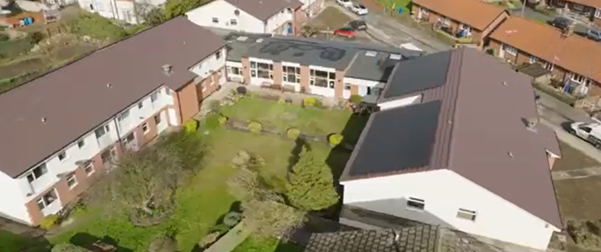

Criteria 5. Scope 1, 2 and 3 greenhouse gas emissions
Our overall emissions have increased from 1,582 to 1,954 tonnes this year, an increase of 372 tonnes.
The increase of 372 this year is due to an increase in transport emissions going from 742 to 1,089, an increase of 347 in scope 1 and 25 tonnes in scope 2. During 2024/2025 our fleet has increased by 91 vehicles due to the fleet renewal process, these vehicles completed 828,978 miles over the last 12 months. The additional 91 vehicles brought our total fleet to 482 vehicles as at March 2025
Our 2024/25 emissions will be our baseline year with the current transport contract running until 2029.
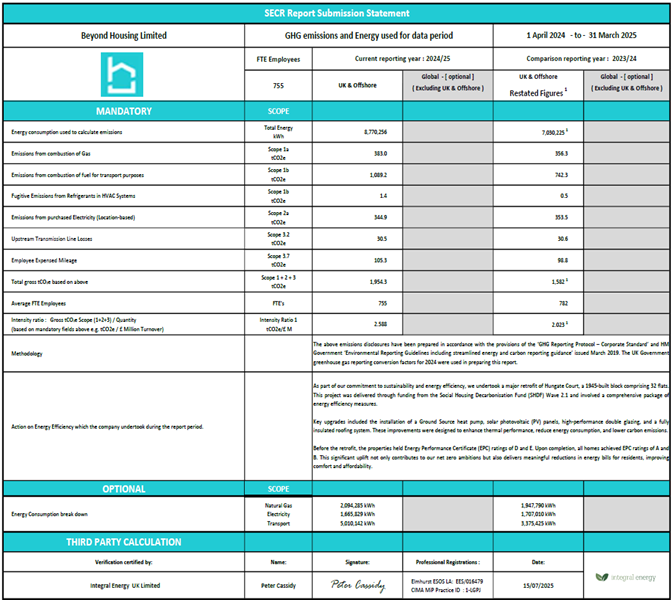
Criteria 6. How has Beyond Housing mapped and assessed the climate risks to its homes and supply chain, such as increased flood, drought and overheating risks? How is Beyond Housing mitigating these risks?
Beyond Housing holds flood risk data for its housing stock, as shown below:
River flood
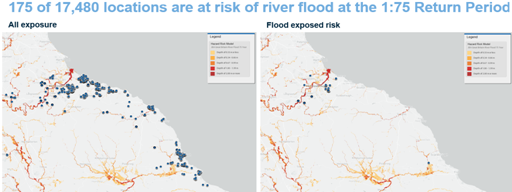
Surface flood
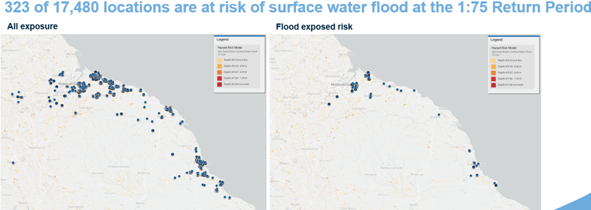
Coastal flood
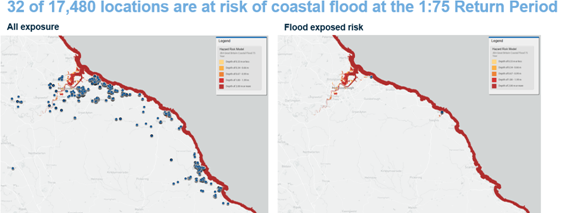
A strategic approach for mitigation for flood, draught and overheating risks will be developed as part of the 2025-2030 Strategic Asset Management Plan.
THEME 2: ECOLOGY
Criteria 7. How is Beyond Housing increasing green space and promoting biodiversity on or near homes?
A strategic approach will be developed as part of the 2025-2030 strategic asset management plan.
Development and new build
Going forward, the Development team will carefully consider biodiversity net gain requirements in all planning. This means ensuring new developments result in an overall increase in biodiversity compared to the site's pre-development state, where possible. If the constraints of the site do not allow for this the net gain can be provided off site.
For regeneration projects like Church Lane North, we've addressed this by repurposing underutilised space into private gardens, enhancing access without reducing green areas, and incorporating 'pocket parks' to create additional public green spaces within the development.
 Case study
Case study
Sandybed Nature Trail
Sandybed Nature Trail was established as a result of collaboration between Scarborough Borough Council and the Sandybed Tenants and Residents Association.
Environmentally conscious community members advocated for the creation of a sanctuary to promote local biodiversity, support native wildlife including birds, bees, and butterflies, and encourage the growth of indigenous plants and meadow grasses.
 Local artists enhanced the trail by crafting wooden sculptures of woodland animals, while informative signage was installed to highlight the ecological and community benefits that the Sandybed Nature Trail offers residents and visitors alike.
Local artists enhanced the trail by crafting wooden sculptures of woodland animals, while informative signage was installed to highlight the ecological and community benefits that the Sandybed Nature Trail offers residents and visitors alike.
Following engagement with local residents regarding the area's future maintenance, differing opinions emerged: some preferred consistently mowed grass, while others prioritised biodiversity. A balanced solution was achieved, maintaining a two-metre strip of mown grass along path edges to prevent encroachment onto footpaths and adjacent fences, while dedicating over 3,000 m² of green space to the management of biodiverse land.
 The trail has already seen the flourishing of Bluebells, Red Clovers, Yarrow, and Cow Parsley, alongside common wildflowers such as Dandelions and Buttercups. The presence of nectar-rich plants is expected to attract bees and butterflies, while dense meadow grasses provide seeds for birds such as Sparrows and Finches. Longer grasses create habitats for a variety of insects, offering sustenance for Robins and Blackbirds.
The trail has already seen the flourishing of Bluebells, Red Clovers, Yarrow, and Cow Parsley, alongside common wildflowers such as Dandelions and Buttercups. The presence of nectar-rich plants is expected to attract bees and butterflies, while dense meadow grasses provide seeds for birds such as Sparrows and Finches. Longer grasses create habitats for a variety of insects, offering sustenance for Robins and Blackbirds.
Looking ahead to 2026, further enhancements are planned to increase the diversity of wildlife and plant species along the nature trail. Collaboration with local schools and colleges will enable ongoing monitoring and stewardship of plant and wildlife populations at Sandybed Nature Trail for years to come.
Criteria 8. Does Beyond Housing have a strategy to actively manage and reduce pollutants? If so, how does it target and measure performance?
A strategic approach will be developed as part of the 2025-2030 Strategic Asset Management Plan.
THEME 3: RESOURCE MANAGMENT
Criteria 9. Does Beyond Housing have a strategy to use or increase the use of responsibly sourced materials for all building works? If so, how does it target and measure performance?
Procurement
Beyond Housing is developing its approach to sourcing and managing responsibility sourced material. Beyond Housing has a strategic relationship with Travis Perkins (TP), its main materials supplier for direct use. TP sources products and services from thousands of suppliers around the world. Responsible sourcing of quality products from approved suppliers is essential to establish resilient and transparent supply chains, and to protect the group and its customers from interruption or reputational damage.
In 2020, TP introduced an online risk assessment tool questionnaire to test suppliers' commitments to responsible sourcing. The questionnaire covers a range of topics, including environmental considerations, health and safety compliance, ethical responsibility and product compliance. TP also carries out site inspections for manufacturers of its own brand products and is continuing to roll out this programme to other suppliers within its group.
Beyond Housing works closely with TP to discuss up-and-coming products and a review of TP's supply chain is a part of this analysis.
Beyond Housing is developing a plan to target and assess the use of responsibly sourced materials with all material suppliers throughout the organisation. The organisation intends to prioritise this area in procurement processes for new suppliers starting in 2026.
Development and new build
Previously, Homes England mandated Code for Sustainable Homes assessments for our projects these requirements are now integrated into building control regulations. To uphold our commitment to sustainability, we stipulate the use of responsibly sourced materials in all new build contracts as part of our design brief.
Criteria 10. Does Beyond Housing have a strategy for waste management incorporating building materials? If so, how does it target and measure performance?
Beyond Housing conducted a waste management review in 2024/2025, selecting providers via a procurement tender that required data on recycling improvements and sustainable waste removal. The new contract began in March 2025. Due to the area Beyond Housing serves, it has two waste management contractors.
Beyond Housing is committed to reducing our environmental impact through robust waste management practices. We actively promote recycling and work to reduce the volume of waste sent to landfill, helping to lower our carbon footprint. Our approach includes regular audits and data tracking to monitor waste streams, ensuring compliance with environmental standards and identifying opportunities for continuous improvement
Contractor one currently diverts 99% of the waste they handle from landfill. The remaining waste, such as asbestos or inert material used for daily cover in landfill operations or for landfill restoration, does not have alternative disposal options. This practice is consistent with a zero waste to landfill policy.
Contractor two currently diverts 95% of all waste we receive from landfill.
Criteria 11. Does Beyond Housing have a strategy for good water management? If so, how does the housing provider target and measure performance?
A strategic approach will be developed as part of the 2025-2030 Strategic Asset Management Plan.
SOCIAL
THEME 4: AFFORDABILITY AND SECURITY
Criteria 12. For properties that are subject to the rent regulation regime, report against one or more Affordability Metric:
1) Rent compared to median private rental sector (PRS) rent across the relevant Local Authority
2) Rent compared to the relevant Local Housing Allowance (LHA)
Social general needs
Social general needs | Hambleton | Scarborough | Teesside | ||||||
Beyond Housing | LHA | Beyond Housing | LHA | Beyond Housing | LHA | ||||
CAT B | 1 Bed | £91.34 | £97.81 | £100.79 | £94.36 | ||||
CAT C | 2 Bed | £121.88 | £126.58 | £104.97 | £126.58 | £108.32 | £109.32 | ||
CAT D | 3 Bed | £133.13 | £149.59 | £112.34 | £149.59 | £117.72 | £126.58 | ||
CAT E | 4 Bed | £120.62 | £166.85 | £130.35 | £172.60 | ||||
Affordable general needs
Affordable general needs | Darlington | Hambleton | Scarborough | Hull & East Riding | Teesside | ||||||
Beyond Housing | LHA | Beyond Housing | LHA | Beyond Housing | LHA | Beyond Housing | LHA | Beyond Housing | LHA | ||
CAT B | 1 Bed | £111.04 | £82.85 | £101.71 | £97.81 | £102.61 | £87.45 | £106.32 | £94.36 | ||
CAT C | 2 Bed | £118.08 | £103.56 | £122.22 | £126.58 | £121.83 | £126.58 | £123.90 | £109.32 | £126.55 | £109.32 |
CAT D | 3 Bed | £125.99 | £121.97 | £132.25 | £149.59 | £141.00 | £149.59 | £133.21 | £126.58 | £135.76 | £126.58 |
CAT E | 4 Bed | £138.34 | £159.95 | £154.52 | £166.85 | £178.29 | £161.10 | £148.64 | £172.60 | ||
Criteria 13. Share, and number, of existing homes allocated to: General needs (social rent), intermediate rent, affordable rent, supported housing, housing for older people, low-cost home ownership, care homes, private rented sector
Existing Homes 2024/25 - Tenure | No. | % |
General needs | 13,281 | 86.84% |
Intermediate | 125 | 0.82% |
Affordable | 1168 | 7.64% |
Supported | 131 | 0.86% |
Housing for Older People (HoP) | 278 | 1.82% |
Low Cost Home Ownership (LCHO) (shared) | 302 | 1.97% |
Market rent | 3 | 0.02% |
Commercial Units | 6 | 0.04% |
Total | 15,294 | 100% |
|
Criteria 14. Share, and number, of new homes allocated to: General needs (social rent), intermediate rent, affordable rent, supported housing, housing for older people, low-cost home ownership, care homes, private rented
|
|
|
New homes in 2024/25 - Tenure | No. | % |
General needs | 4 | 1.40% |
Intermediate | 9 | 3.16% |
Affordable | 145 | 50.88% |
Supported | 91 | 31.93% |
Housing for Older People (HoP) | 0 | 0.00% |
Low Cost Home Ownership (LCHO) (shared) | 36 | 12.63% |
Totals | 285 | 100% |
Criteria 15. How is Beyond Housing trying to reduce the effect of high energy costs on its residents?
Beyond Housing is committed to improving the energy efficiency of our homes. We only install 'A' rated boilers, and our annual capital works program focuses on enhancing energy performance. This includes loft and wall insulation, double glazing, kitchen and bathroom upgrades, and other energy-saving measures alongside essential repairs.
We actively support our customers in accessing government grants such as winter fuel allowances and energy support schemes. Our ambitious goal is to upgrade all homes with an EPC rating below C by 2030, reducing energy consumption and costs for our customers.
 Case study
Case study
Working with The Green Doctor
As part of the 'Locality Plan' developed and delivered in Dormanstown in Redcar, the community told us that they were struggling to pay their bills and manage their finances. We funded support from 'Green Doctor' over eight weeks to support the identified objective to support people to be more informed about how to reduce their energy usage and hopefully in turn save money on bills.
In delivering this objective:
· 139 people were engaged, 34 of whom were Beyond Housing customers
· 22 partner organisations were engaged to support
· 17 homes were visited
· 22 telephone calls
· 3 drop-in appointments
· 16 information sessions held for the community to access.
Through this, the community was provided with:
· Energy efficient light bulbs
· Radiator reflectors
· Dehumidifiers
· Warm clothing
· Support with understanding meters
· Support to understand bills and switching suppliers
· Dehumidifiers
· Hot water bottles.
Criteria 16. How does Beyond Housing provide security of tenure for residents?
Beyond Housing primarily offers assured tenancies to its customers, providing a high level of security and stability. This means that tenants have the right to remain in their homes indefinitely, subject to fulfilling the terms of their tenancy agreement.
In specific circumstances, such as temporary or move-on accommodation or assured shorthold tenancies or, occasionally, licences may be used where these are considered the most suitable tenancy type to meet the individual needs of the customer or the criteria of the service offered.
Benefit advice is provided to tenants and interventions built into our processes in place to prevent evictions where possible.
THEME 5. BUILDING SAFETY AND QUALITY
Criteria 17. Describe the condition of the housing provider's portfolio, with reference to:
% of homes for which all required gas safety checks have been carried out.
% of homes for which all required fire risk assessments have been carried out.
% of homes for which all required electrical safety checks have been carried out.
99.99% of homes with a gas appliance have an in-date accredited gas safety check.
100% of buildings have an in-date and compliant fire risk assessment.
98.75% of homes have an in-date electrical safety check.
Assessment cycles for fire risk are assigned based on risk. The current programme is set out below.
Assessment cycle | No. | % |
Three months | 0 | 0% |
Annual | 220 | 63.4% |
Three years | 127 | 36.6% |
Total | 347 | 100% |
Criteria 18. What % of homes meet the decent homes standard? Of those which fail, what is the housing provider doing to address these failings?
99.1% of homes meet the decent homes standard.
There was a total of 16 decent home failures. 14 thermal comfort failures, the work for which is all planned for our 25/26 energy efficiency programme. The remaining two failures were: one roof, which was not complete in the year's investment programme due to notifiable asbestos works causing an unforeseen delay but has since been completed and one window set, at a property in a conservation area, requiring planning permission, scheduled for completion in 25/26.
All Beyond Housing's homes are maintained to the decent homes standard as a minimum. Over the next five years, we'll develop a new, higher standard for our homes, the Beyond Housing standard. This will focus on improving energy efficiency through better heating systems, insulation, and damp proofing. We'll also explore the use of renewable technologies to create more sustainable and modern homes for customers.
 Case study
Case study
Improvement works
A £13 million investment was made in upgrading existing homes during 2024/25.
This comprehensive refurbishment program delivered substantial improvements to the local housing stock. Key highlights include:
· Modernisation - 151 new bathrooms, 431 new kitchens, and 741 new boilers were installed. Heating systems were enhanced with the replacement of 1 air source unit and 19 full systems. Additionally, 41 properties underwent complete rewiring
· Customisation - Residents enjoyed personalised living spaces through a wide range of choices for kitchen units, worktops, flooring, bathroom wall cladding, and interior paint colours
· Enhanced security and comfort - New composite doors were fitted in 317 homes, and 278 properties received upgraded windows. Customers could select from five door designs, six colours, and two glazing options
· Exterior Improvements - To enhance property appearance and durability, 140 roofs were replaced, 105 properties were fully repointed.
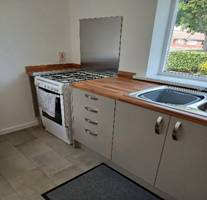 These improvements enhance the comfort and safety of and contributed to the overall aesthetic appeal of the community.
These improvements enhance the comfort and safety of and contributed to the overall aesthetic appeal of the community.
We partnered with Novus Solutions to install composite fire doors across 593 flats and communal areas enhancing fire and smoke protection. In communal areas, electric cupboards, and store cupboards have been upgraded to meet regulations and improve safety for customers and colleagues.
Criteria 19. How do you manage and mitigate the risk of damp and mould for your residents?
Beyond Housing is committed to mitigating the risk of damp and mould for customers. We have implemented a robust approach to identify, assess, and address damp and mould issues promptly.
Customer reported cases
Beyond Housing has a stand-alone script for categorising the risk for damp and mould. This dictates how quickly we visit the property dependent on the category rating.
Beyond Housing's escalation process is as follows:
· Severe HHSRS - 24hrs
· Severe customer reported - 24hrs
· Moderate - 15 calendar days
· Slight - 60 calendar days.
We introduced tools to support diagnose and categorise customer reported damp and mould which include:
· A scoring matrix
· Video calls
· Designated advisors to specialise in damp and mould case management.
HHSRS reported cases
Surveyors carry out stock condition surveys to 20% of properties annually, ensuring a full inspection of every property within a five-year cycle. If damp or mould is identified during a survey, a HHSRS job is initiated and escalated for immediate action. Dedicated operatives address the issue on-site, performing necessary remedial works where able to and document the process and follow-on works digitally using a standardised form.
Once the risk has been removed any follow-on works must be completed within the agreed timeframe. When a damp and mould operative attends an affected property, they complete a live inspection form identifying the initial category rating and end category rating following remedial works. The report also identifies if the property is safe to reside once initial works have been carried out which then sends an automated report to the responsible person to action forming an escalation process.
Post inspection 9 months
Beyond Housing complete a physical 9-month post inspection for all severe HHSRS and customer reported cases.
Advice on home ventilation
When a report of typical condensation rating is reported the customer is sent an advice leaflet and hygrometer to their home to provide guidance on how to ventilate their home and reduce condensation levels. Advice leaflets and hygrometers are distributed by operatives during visits and also sent to customers via post for 'typical' rated condensation diagnosis.
Resident engagement
We consulted with residents to gather valuable feedback on our website information and advice leaflet. This input helped us improve the clarity and effectiveness of our materials, making it easier for customers to understand how to report damp and mould issues.
We've published a new damp and mould policy which was published in May 2024. This comprehensive approach ensures our policies and information align with customer needs and Awaabs law.
To provide even better support, we have implemented a dedicated team of case management handlers to handle category 1 and 2 damp and mould reports. These specialists are the primary point of contact for affected customers, providing clear communication throughout the entire process. From initial report to completion of works, residents will receive regular updates on progress.
We have implemented CRM to ensure significant damp and mould reports are dealt with in line with Awaabs Law legislation timescales
Enhanced reporting
The table below confirms the total number of Customer and HHSRS reported damp and mould cases requiring action for category 1 and 2.
SOR | Jobs | Reported cases | Percentage |
HHSRS Category 2 | 150 | 166 | 1.05% |
HHSRS Category 1 | 16 | ||
Customer Category 1 | 10 | 781 | 4.92% |
Customer Category 2 | 771 | ||
Grand Total | 947 | 1,063 | 7.08% |
The complete number of individual properties requiring action for category 1 and category 2 during the 24/25 period was 947, which accounts for 5.97% of Beyond Housing's stock.
THEME 6: RESIDENT VOICE
Criteria 20. What are the results of Beyond Housing's most recent tenant satisfaction survey? How has Beyond Housing acted on these results?
The Tenant satisfaction measures (TSMs) overall score for 2024-25 is 67%, one point down on the previous year however there has been a significant improvement from the first collection in October 2024 and the second collection in March 2025. This is a promising path and if this trajectory is maintained.
The scores compared to the previous year show the following:
· Nine scores have gone up - Top movers are communal cleaning, complaint handling and time taken to complete repairs
· Three have stayed the same - How we listen to customers and act upon their feedback, how we keep customers informed and how we treat them
· Three have decreased - The overall satisfaction with Beyond Housing as a whole, the satisfaction that homes are well maintained and how we handle ASB.
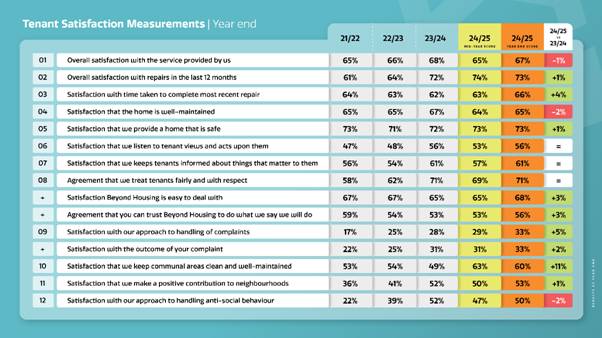
We use tenant satisfaction measures to inform our strategic plans. By reviewing services with lower scores, we aim to identify areas for improvement and enhance the customer experience. Additionally, we strive to learn from best practices in areas where we have achieved high scores.
You can read more about Beyond Housing's tenant satisfaction scores here.
Criteria 21. What arrangements are in place to enable the residents to hold management to account for provision of services?
Beyond Housing believes customers are the experts on the services they receive, the homes they live in and the communities around them. What our customers think really matters to us, and we actively encourage customers to engage and scrutinise our services to help us shape, transform and improve them and to hold us to account.
Through policy reviews, service deep dives, locality planning, and other initiatives, customers have a real voice in how we operate. Their 'stamp of approval' is essential for our communications, and their input is also crucial in shaping our services through tender reviews and senior recruitment processes.
To meet the requirements of the new consumer standard, we developed a comprehensive customer scrutiny framework for 2025-2026. This framework will ensure that customer feedback continues to drive positive change across Beyond Housing.
You can read more about the 'Be involved' offer here and read past customer voice reports here.
Criteria 22. In the last 12 months, how many complaints have been upheld by the Ombudsman and how have these complaints (or others) resulted in change of practice?
In 2024/25, Beyond Housing received 553 complaints from over 15,000 homes and 30,000 customers to whom we provide services. Of those 553 complaints received, 421 were upheld. You can view the full 2024-2025 annual complaint performance and service improvement report here.
THEME 7: RESIDENT SUPPORT
Criteria 23. What support services does Beyond Housing offer to its residents. How successful are these services in improving outcomes?
To help build sustainable and economically thriving communities, Beyond Housing provides an employment support service to help people get nearer to or into employment or training. This involves the provision of a person centred wrap around support service that can include confidence building, career planning, identifying training needs, support with job searching, building CVs and job applications and interview skills, essentially identifying and working towards removing the barriers to employment.
In addition, and as a pathway into employment we provide volunteering, and work experience opportunities to build employability skills, a sense of purpose and community connection. Beyond Housing also directly employs over 30 apprentices every year, aiming both to increase this year on year to 50, and to ensure at least 50% of the new intake comes from its residents. The programme has excellent success rates, with the majority of the apprentices finding permanent employment with Beyond Housing.
In 2024/25 we supported residents with
· 631 work experience hours through 15 placements
· Recruited 20 apprentices, and in total employed 30 apprentices
· Helped 330 people get closer to or become work ready
· Helped 104 people into employment
· Recruited 16 new volunteers
· Volunteers provided 7659 hours of their time.
Use of the HACT tool indicates that we get a social return on investment of £2.85 for every £1 we spent on these activities.
 Case study
Case study
Danny's story
Danny is a 28-year-old man living in a Beyond Housing property. He has dyslexia and some physical health conditions resulting from a back injury sustained at a younger age. Since 2021, Danny has not been in paid employment but volunteers once a week at Westfield Farm, where he assists with administrative tasks and updates the job board.
During his initial appointment, Danny reported experiencing anxiety and indicated that, while interested in employment, he was uncertain about which career path to pursue due to physical limitations that make labour-intensive roles unsuitable. He brought his certificates for previously obtained qualifications to facilitate updating his CV and discussing possible options for suitable job roles.
Support was provided to help Danny identify skills based on his qualifications; he determined that an administrative role would be appropriate given it would not require prolonged standing or significant physical effort. Assistance was given with job searching, identifying vacancies, refining his CV, and preparing a covering letter for prospective employers.
After a period of limited responses to job applications, alternative strategies were explored to support his goal of working in administration. Danny and the support worker contacted Redcar College to explore part-time course options, including a Level 2 Business Admin course that could be completed online and from home. Danny decided to apply for this course.
Following his application, Danny participated in a telephone interview with the college and gained acceptance onto the course. Initially, he found some course content challenging. Support was provided to break down coursework questions, facilitating the development of his responses. Danny was encouraged to seek assistance from course tutors as needed.
Outcomes
Danny has less than four weeks remaining in the course and has passed all sections so far. His confidence regarding the course has increased, and he reports that obtaining the Level 2 qualification may provide the necessary skills to secure employment or an apprenticeship in administration.
Reach & Respond Services
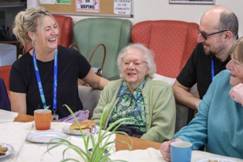 Reach & Respond provides a range of services to help people stay happy, healthy and independent in their own homes no matter their age. Our services range from technology solutions to welfare calls and visits. We offer a range of Lifeline home units, which can be combined with telecare sensors from our large portfolio to create personalised care and support.
Reach & Respond provides a range of services to help people stay happy, healthy and independent in their own homes no matter their age. Our services range from technology solutions to welfare calls and visits. We offer a range of Lifeline home units, which can be combined with telecare sensors from our large portfolio to create personalised care and support.
Reach & Respond provides customers and their family with the reassurance that no matter what the emergency or when it happens, someone will be there to help. With just the push of a button, our response team is here 24/7, 365 days a year. On average it takes one of our responders 24 minutes to arrive. Our responders are often able to assist customers without the need to call the emergency services, though sometimes customers do require medical intervention. Talking to our customer's and supporting them while they wait for an ambulance is a part of the responder role that is often forgotten or overlooked but it can be the most rewarding.
In addition to our emergency response service, we offer welfare visits to customers who would like some company or simply to check they are ok. One of our customers said "Having someone to come and check on me every morning is reassuring, especially if anything goes wrong, I know someone is coming. My family lives far away and I like the company every day. The staff are very nice and always listen to me". You can find out more about the service offered by Reach & Respond here.
Me & My Home - This is a portal for customers to take control and manage their tenancies online and in one place. They can check their rent balance, make a payment, report and track repairs, update personal information, view, and print rent statements. Read more about Me & My Home here.
Westfield Farm - This is our community resource and training centre based in Dormanstown which offers free internet access. In 2024/2025 82 new customers accessed Westfield Farm and 1393 appointments were made to by customers to use the IT suite. In partnership with Lighthouse Navigation NE, we delivered our first digital cafe which consisted of six sessions to raise awareness and support customers to engage with services digitally and connect. Read more about Westfield farm here.
Aids and Adaptations - The adaptations team delivers minor adaptations directly to customers in their home and have extended this offer to include 'Adaptations Without Delay' whereby some minor adaptations can be provided without the need for an Occupational Therapy assessment (such as grab rails, key safes, lever taps and additional banisters). Beyond Housing works in partnership with local authority Home Improvement Agencies, Handyperson's Adaptations and Occupational Therapy teams to deliver minor and major adaptations and identify (and feed into the development of) suitable accommodation for customers with specific requirements for adaptations. This supports customers to remain living independently in their homes without the need for supported or specialist accommodation. Read more about the adaptions service here.
Safeguarding - Beyond Housing has a dedicated safeguarding coordinator to ensure that customers and their families are supported against any potential abuse. Their role is underpinned by service area safeguarding leads to embed safeguarding in all service delivery. This is done through our induction and training and through awareness raising with all colleagues in parallel with detailed policy and procedure. We have developed a concerns system, monitored continually, where colleagues and external agencies can raise concerns to be investigated, as well as partnership working with statutory, specialist and third sector services to deliver robust interventions to support customers. Read more about safeguarding here.
Income management (benefit case workers) - This team focuses on providing intensive customer support including advice on universal credit, fuel poverty grant support and advice on direct government rental support. In 2024/25 this service supported customers across 481 cases to access a further £2,185,083 in benefits, resulting in the level of rent arrears remaining under control. Read more about income management support here.
Community partnership and engagement - The community partnership and engagement team are a dedicated resource supporting local initiatives and provide the link between Beyond Housing, communities and external partners. They work alongside teams from across the business and external partners to support and deliver community change. One example of this is in working with partners and local community to understand and address community needs in Dormanstown in Redcar, through the development of a 'Locality Plan' for the area. This involved seeking resident views on the main issues for their community though drop ins, door to door and survey consultation. So far, this work has delivered two community clean up days, supported a new breakfast club and Eco Shop in the primary school, attracted external funding and support, provided one to one support in identifying and reporting repairs and money management advice. Read more about how we engage with our customers here.
Intensive housing management service - The intensive housing management service is delivered by tenancy management advisors and underpinned by tenancy support officers. The service is available to all customers for an initial period of 13 weeks. It provides assessed needs, support and risk planning, and hands-on support to empower customers to sustain their tenancy. Typically, customers using the service will be struggling to declutter their homes due to physical disability or clinical condition, such as hoarding. Tenancy management advisors also assist customers to access longer term support through statutory services, such as adult social care, or third sector voluntary support services. Customers engaging with this service are 84% more likely to remain living independently in their own home than without support.
 Case study
Case study
Intensive housing management
This case study details successful intervention to address the complex needs of a customer presenting significant physical and mental health issues, alongside a property in extremely poor and unsafe condition. Through a coordinated approach involving health, social care, and housing services, the customer's health, wellbeing, and living were significantly improved, enabling them to regain independence and live more safely.
About the customer
The customer was referred to the intensive housing management service due to a combination of factors indicating a high level of vulnerability including:
· Poor physical health - limited mobility, dependency on aids, and irregular medication adherence
· Poor mental health - characterised by withdrawal, medication non-compliance, and sleep disturbance
· Hazardous living environment - characterised by extreme clutter, lack of essential amenities, and safety hazards.
· Initially customer existing in one room, sleeping and cooking and eating there. Not accessing bathing or toileting facilities.
Intervention approach
A multi-faceted approach was used to address the customer's complex needs, including:
Physical health
· Healthcare access and management - Facilitated GP care, attended appointments, and coordinated investigations. Supported use of patient transport to promote attendance at vital appointments
· Mobility and safety - Referrals to occupational therapy and physiotherapy led to provision of essential aids and adaptations. The property was made accessible through installation of grab rails
· Care support - Social care assessment resulted in the implementation of a daily care package to administer medication and four times weekly support for daily living activities and accessing the community.
Mental health
· Healthcare engagement - Supported the customer to re-engage with mental healthcare and re-establish medication. Customer waiting to be assessed for neuro diversities
· Supported customer to attend therapies to promote decluttering with psychotherapist
· Environment optimisation - Improved sleep quality through sleep hygiene practices and decluttering.
Safety
· Fire safety - Arranged pre- and post-intervention fire safety assessments and implemented necessary measures. Arranged provision of telecare supported living practices to reduce fire risks
· Property hazards - Addressed property damage caused by the customer's physical limitations and removed external hazards
· Gas to property which had been capped off for safety reasons was reconnected and gas central heating system installed.
· Full electrical rewire
· New bathroom provided with aids and adaptations to promote safe bathing and toileting
· New kitchen provided and support to ensure planned works could be carried out with minimum distress.
Finances
· Debt management - Established payment plans with utility providers and addressed non-priority debts
· Financial empowerment - Supported the customer in opening a new bank account, setting up direct debits, and preventing predatory lending. Promoted using banking apps to better manage finances.
Home environment
· Decluttering and cleaning - Worked intensively with the customer to declutter and clean the property, achieving a significant improvement in living conditions
· Arranged and supported pest control to rid property of vermin and implemented hygienic patterns of living to reduce risk of return
· Essential furnishings - Provided support to purchase a bed, enhancing the customer's comfort and wellbeing
· Provided support to purchase white goods
· Avoided legal action being taken regarding historical hoarding thus reducing stress to customer, and directly improving mental health.
Outcomes
The intensive housing management intervention resulted in a substantial improvement in the customer's overall circumstances:
· Improved physical health - through medication management and increased mobility with adaptations
· Enhanced mental health - Improved sleep quality and overall wellbeing through medication adherence, environmental improvements and accessing therapies
· Safe and comfortable home - A clean, decluttered, and safe living environment was established with defined spaces for sleeping, cooking and personal hygiene / bathing
· Increased independence - The customer gained the ability to access the community with carers and manage daily living tasks with increased confidence.
· Enhanced financial stability - Improved financial management through benefit maximisation and debt reduction.
Reach & Respond partnership working
Reach & Respond maintains a partnership with Carers Plus, aimed at engaging customers in the community to support social inclusion. Through this partnership, customers participate in activities such as crafts, chair exercises, and organised events at local community centres.
In 2024/2025, an Independent Living Forum was established to facilitate conversations and gather feedback on customer priorities and perspectives regarding the future of the service. Information collected through the forum contributes to the development of services provided by Beyond Housing and Reach & Respond.
In collaboration with North Yorkshire County Council, funding was secured for a digital inclusion Alexa project supported by the UK government's UK Shared Prosperity Fund. A team of trained digital champions conducted sessions at community centres, and customers received Alexa devices for their homes.
THEME 8: PLACEMAKING
Criteria 24. Describe the housing provider's community investment activities, and how the housing provider is contributing to positive neighbourhood outcomes for the communities in which its homes are located.
Provide case studies of where Beyond Housing has been engaged in placemaking or place shaping activities
Wilton Avenue, Dormanstown - Neighbourhood Improvement project
The grassed area behind Wilton Avenue, in Dormanstown had become a hotspot for persistent fly tipping and illegal off-road motorbike and quad bike activity. Its proximity to residents' back gardens raised significant concerns about safety, noise, and anti-social behaviour. To address these issues and restore community confidence, we consulted with local residents who requested that we close off the area to the public. Access to the open space has now been restricted to the public, through the installation of security fencing and gated entry points. These measures aim to deter fly tipping, prevent off-road vehicles, and reduce instances of antisocial behaviour, ultimately creating a safer and more secure environment for residents.
Clear Hold Build
The Barrowcliff 'Clear Hold Build' initiative officially launched in March 2024 and is part of a national approach to tackle areas impacted by organised crime. It is a multi-agency effort led by North Yorkshire Police and is known locally as 'Building Barrowcliff Together'.
· Clear: Disrupt and remove serious and organised crime networks
· Hold: Maintain a police and partner presence to prevent re-entry
· 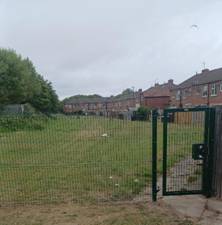 Build: Rebuild the community through long-term support, engagement and investment.
Build: Rebuild the community through long-term support, engagement and investment.
The immediate focus of the partnership is on tackling crime and anti-social behaviour with a longer-term, holistic approach to re-building and supporting the neighbourhood through targeted enforcement, community engagement and support services.
The initiative has been the catalyst for intensive involvement on the estate and, with Beyond Housing's role as the largest social housing provider in the area, has instigated a 'Locality Plan' approach from the organisation.
To date, Beyond Housing has implemented a range of physical measures to improve the safety and security of external communal spaces across several of our housing blocks and individual properties. These enhancements have included the targeted distribution of Ring doorbells where appropriate, installation of fencing, security gates and anti-climb solutions. We continue to work closely with North Yorkshire Police, securing closure orders and sharing intelligence to address persistent issues across the estate. Our presence remains consistent, with regular drop-in sessions held at the community hub, staffed by our Housing, Tenancy Support, Income, and Employment teams to provide accessible, face-to-face support. Beyond Housing has also invested £29,720 in funding and equipment for local  community groups and continues to collaborate with these organisations on future initiatives, supported by contractor social value contributions and internal resources.
community groups and continues to collaborate with these organisations on future initiatives, supported by contractor social value contributions and internal resources.
Further steps include the conversion of a vacant flat into a dedicated satellite office for shared use by Beyond Housing, the police, and other local partners. In addition, we are exploring longer-term regeneration plans to bring an underused block of flats back into full residential use, helping revitalise the wider neighbourhood.
GOVERNANCE
THEME 9: STRUCTURE AND GOVERNANCE
Criteria 25. Is Beyond Housing registered with the regulator of social housing?
Yes, our registration number is LH4401.
Criteria 26. What is the most recent governance and viability regulatory grading?
G1/V1 - Regulatory judgement - Stability check, 15 January 2025.
Criteria 27. Which Code of Governance does Beyond Housing follow?
Beyond Housing has adopted the 2020 NHF (National Housing Federation) Code of Governance.
Criteria 28. Is Beyond Housing a 'not for profit' organisation?
Yes, Beyond Housing is a 'not for profit,' Community Benefit Society.
Criteria 29. Explain the Beyond Housing board manages organisational risk.
Beyond Housing has an established risk management framework that identifies and plans to mitigate potential risks while exploring future opportunities. The aim of the management framework, is to make the management of risk: dynamic, iterative, and responsive to change. This process involves the systematic application of policies and procedures and is driven by the strategic objectives.
The strategic risk register is regularly reviewed by the executive and senior leadership teams, and performance is reported quarterly to Board and the Audit and Risk Committee. The audit and risk Committee undertake a more detailed review of risks, including scrutiny of risk controls, mitigating actions and emerging risks.
The board regularly reviews strategic risk and reviews risk appetite annually to ensure that the strategic risk register accurately reflects the external and operating environments and that the risk appetite remains fit for purpose.
Key risks such as health and safety, financial stability and data security take a high priority. Significant emerging risks are also monitored (rising interest rates, rent caps and inflation). Risks are analysed according to their impact and likelihood.
Criteria 30. Has Beyond Housing been subject to any adverse regulatory findings in the last 12 months (e.g. data protection breaches, bribery, money laundering, HSE (Health and Safety Executive) breaches or notices) - that resulted in enforcement or other equivalent action?
No.
THEME 10: BOARD OF TRUSTEES
Criteria 31. How does the housing provider ensure it gets input from a diverse range of people, into the governance processes? Does the housing provider consider resident voice at the board and senior management level? Does the housing provider have policies that incorporate Equality, Diversity and Inclusion (EDI) into the recruitment and selection of board members and senior management?
Customer Voice
Building on substantial progress in recent years, Beyond Housing is committed to further enhancing our customer-centric approach. During 2024/25, we evaluated our existing methods for incorporating customer feedback and establish a dedicated customer forum within our corporate governance framework. This enables us to effectively demonstrate our commitment to listening to customers and providing opportunities for them to shape our decisions.
A customer voice report is presented to board quarterly.
We considered the customer voice in all board reports, committee reports and policy reviews, and is included in the templates to ensure this is reflected.
EDI in recruitment
There is a strong focus on EDI in recruitment, with links between our recruitment policies and procedures with our EDI policy and statement of principles. We encourage applications from people from all backgrounds, including our own customers, and have interview guarantee schemes for both the armed forces and those with a disability. All applications are anonymised until shortlisting is complete to remove the risk of bias and all recruiting managers are trained on fair recruitment practices. We encourage applications from our own customers through our employability offer, offering them volunteering opportunities to build their skills, work experience and VIP days during our apprentice recruitment, along with our wrap around one-to-one employability support service.
We also operate a stringent review of any appointments where the successful candidate already has a close personal connection with someone in the business to ensure a fair and unbiased process has been followed before the offer of appointment is made. We continue to develop our fair and inclusive recruitment processes, exploring better use of skills tests and inclusive practices for those who are neurodiverse.
- What % of the board are women? - 70%
- What % of the board are BAME? - 0%
- What % of the board are residents? - 0%
- What % of the board have a disability? - 0%
- Average age of the board - 58.3 years
- Average tenure of the board - 4 years
Criteria 32. What % of the Beyond Housing board and management team has turned over in the last two years?
| % |
Board | 40% |
Management | 18% |
Criteria 33. How many board members on the audit committee have recent and relevant financial experience?
There are three members of the audit and risk committee with recent and relevant financial experience.
Criteria 34. What % of the board are non-executive directors?
Nine of the 10 board members (90%) are non-executive directors. The chief executive officer is the only executive director on the board.
Criteria 35. Has a succession plan been provided to the board in the last 12 months?
Yes, the board succession plan is presented quarterly to the governance and review committee and is used to inform future recruitment.
Criteria 36. For how many full years has Beyond Housing current external audit partner been responsible for auditing the accounts?
One - Beyond Housing's external audit contract is for a term of 3 years, with the option for a further two years (in line with the adopted Code of Governance - maximum 6 years).
Criteria 37. When was Beyond Housing's last independently run, board effectiveness review?
An independent governance review (including board effectiveness) will be completed in 2027 (3 yearly). The previous review was carried out in 2024.
Criteria 38. How does Beyond Housing handle conflicts of interest at the board?
There is a declaration and conflicts standing item on board and committee agendas. Conflicts/potential conflicts are dealt with by the board chair/senior independent director/audit and risk committee (whichever is deemed appropriate) - with reference to the rules, agreement for services, code of conduct, terms of reference etc.
THEME 11: COLLEAGUE WELLBEING
Criteria 39. Does Beyond Housing pay the real living wage?
Yes, Beyond Housing pays the real living wage, as defined annually by the Living Wage Foundation, which is higher than the national living wage. This includes apprentices from year two. During year one they are paid at least the apprentice rate for 18+, regardless of their actual age.
Criteria 40. What is Beyond Housing's gender pay gap?
Beyond Housing is committed to equality, diversity, and inclusion. Our 2024 gender pay gap figures demonstrate progress compared to the national average. The mean gender pay gap was -0.9 (showing that on average women were paid slightly more) and the median was 6.4%, significantly lower than the UK's 13.8% and 13.1% respectively.
We believe in transparency and go beyond gender pay. Our annual general equalities pay gap report also covers ethnicity, religion, disability, and sexual orientation. You can read the equalities pay gap report here.
Criteria 41. What is Beyond Housing CEO/worker pay ratio?
The CEO ratio is calculated by comparing the CEO hourly rate to the whole company median hourly rate using the same reference data as the pay gap data. In 2024, this gave a payment ratio of circa 6:1. Our median colleague was a bricklayer or plasterer who is in receipt of a tool allowance and multiskilling allowance. Research conducted by The Guardian in August 2022 suggested the average CEO ratio in the UK was 109:1[1].
Criteria 42. How is the housing provider ensuring equality, diversity and inclusion (EDI) is promoted across its staff?
Beyond Housing is a proud Investor in Diversity, accredited by the National Centre for Diversity (NCD) since October 2021. Currently ranked 66th in the NCD's top 100 most inclusive employers, we are committed to fostering a diverse and inclusive workplace.
Our EDI approach is underpinned by an annual action plan, informed by NCD recommendations. A dedicated EDI steering group, including Senior Leadership, oversees this plan, while a passionate team of volunteer EDI Champions drives its implementation.
The action plan includes an annual schedule of campaigns and activities to raise awareness amongst colleagues, tapping into national and local campaigns where possible. Beyond Housing has a zero-tolerance approach to bullying and harassment and offers a range of avenues to raise a concern or complaint, including the anonymous whistleblowing reporting tool and an established EDI ally scheme.
Transparency and accountability are key. Our annual EDI annual report, outlines progress and initiatives. EDI is embedded in our company values, code of conduct, and colleagues participate in regular training through their learning portal.
In 2024 we made the decision to adopt the National Centre for Diversity acronym FREDIE (Fairness, Respect, Equality, Diversity, Inclusion and Engagement) and rolled this out with our teams because we believe putting fairness at the forefront is the right thing to do. We are still migrating away from referring just to EDI replacing it with the expanded FREDIE acronym as our existing equalities documents come up for review.
We started to train colleagues on neurodiversity and trained all managers on sexual harassment prevention. We consult with both customers and colleagues about our FREDIE practices and make appropriate amendments to our plans when the feedback suggests it is appropriate.
Criteria 43. How does Beyond Housing support the physical and mental health of colleagues?
Employee assistance programme - an excellent health cash plan with UK Healthcare which helps contribute to colleagues' day-to-day health and wellbeing expenditure. The scheme offers 24 hour/7 days per week counselling, legal advice, bereavement assistance, general health and wellbeing advice, and access to medical professionals. The scheme also provides cash payback on a range of medical services.
Health advocates - Beyond Housing has a group of colleagues from across the business who are passionate about health and wellbeing and are instrumental in developing our positive wellbeing culture.
The group welcomes everyone to participate in and share their health and wellbeing achievements and provide information on upcoming health and wellbeing events and campaigns, health topics, fact sheets and external support group contact details.
Mental health first aiders - Beyond Housing has a number of trained mental health first aiders, promoted to colleagues on a rolling monthly basis. These volunteers support colleagues who are approaching or in crisis, enabling them to get immediate support from the right agencies when it is needed. Mental Health First Aiders now conduct monthly random wellbeing calls, to proactively check on the wellbeing of colleagues to demonstrate the importance of good mental health, the commitment of the employer to this, and to prevent progression to crisis. Groups statistically at higher risk of suicide are prioritised in the roll out of these calls.
Better Health at Work Award - In 2023, the company was proud to achieve continuing excellence standard for the 'Better Health at Work award' a year after attaining gold, following a sustained programme of campaigns aimed at supporting the physical and mental wellbeing of our colleagues. This level of award was retained in 2024.
The team delivered a range of activities and initiatives including: cost of living workshops, steps challenges, mental health awareness week, alcohol awareness campaigns, free flu vouchers, on-site physiotherapy appointments; and tapped into national campaigns on issues such as men's health week, skin cancer awareness month, cervical screening week, Samaritans talk to us month and world sleep day.
Office remodelling - In 2022, we started the remodelling of our office spaces. The new layouts promote agile working, creating a variety of spaces to encourage colleagues to move and mix more and include social spaces and wellbeing rooms. The remodelling of our office spaces is part of our commitment to creating a healthy and productive work environment.
The social spaces are designed to be informal and inviting, with comfortable seating and plenty of natural light. These spaces are perfect for spontaneous conversations, collaborative sessions, or just taking a break from work. The wellbeing rooms are equipped with relaxation amenities such as yoga mats and bean bags. These rooms provide a quiet space for colleagues to de-stress, recharge, and improve their mental health.
Criteria 44. How does the housing provider support the professional development of its staff?
All colleagues are offered an annual 'be your best' conversation with their manager, with quarterly check ins to explore their objectives, performance, development needs and future aspirations.
Beyond Housing has its own learning platform, hosting a broad range of essential and optional e-learning modules, giving colleagues the ability to manage their own professional development.
Colleagues are encouraged to undertake relevant formal qualifications and those who wish to do this to support their career development can receive financial support with the course costs as well as time off to participate.
In 2023/24 all colleagues with people management responsibility participated in a centrally led leadership and management development programme to develop their skills as managers and support performance improvement. This programme is currently being review for delivery to relevant new starters.
Beyond Housing develops and maintains networks to enable effective provision of professional development activities such as SHINE (Social Housing In North East). The SHINE network has contracted with training providers to deliver housing qualifications in advance of the regulatory competence requirements and 10 colleagues from Beyond Housing commenced participation in the pilot groups for the level 4 and level 5 qualifications.
Further investment in professional development of colleagues has been made, with the introduction of 2 further learning and development roles to continue to build on learning and development activities and frameworks such as induction for new starters and career journey maps and skills matrices to further help colleagues plan their career with Beyond Housing.
THEME 12: SUPPLY CHAIN MANAGEMENT
Criteria 45 How is social value creation considered when procuring goods and services?
Since 2022, for all contracts where spend exceeds £50k in total contract value, we stipulate that contractors must commit to contribute a 1% return in revenue, goods or services that can be reinvested into our priority estates to support key community projects across our portfolio.
Our main materials supply contract, kitchen, bathrooms and windows supply agreement, and cleaning and scaffolding contracts all provide funding to be utilised on social value related works. Projects approved include community play zones, community cafes, school farm shops and community support initiatives such as food banks, furniture and warm homes schemes.
Where contract values do not exceed this threshold, we will actively encourage suppliers, service providers and contractors to provide a social value offering for our customers such as work experience placements or offer their own time in the form of voluntary work to community and charity groups to improve local community spaces.
 Case study
Case study
Supply chain
Beyond Housing employability customer, Anthony, joined Equans for a week of work experience as a Project Manager as part of their social value commitment to Beyond Housing, Equans committed to supporting our customers to gain experience to support taking their first career steps.
He was able to gain some valuable experience of projects as they are nearing completion and some of the inspection works needed to close these down alongside meeting with personnel involved in a range of the projects. Anthony was able to learn from Pre - Tender Adjudication meetings, information gathering for meetings, attending sites and working with the planners for programming works.
Beyond Housing employability customer were able to support our customers and received great feedback from Anthony; 'Everything is great. Right from the communication with Beyond Housing to passing me on to a great team that handled the work experience with professionalism.' This opportunity puts Anthony in a great position to develop and grow in his career.
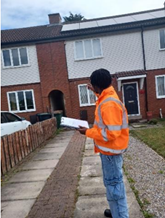
 |
Criteria 46 How is sustainability considered when procuring goods and services?
What measures are in place to monitor the sustainability of your supply chain when procuring goods and services?
Beyond Housing consider sustainability when pricing goods and services by ensuring that all contractors are required to outline their sustainability credentials by submitting their environmental policy/environmental purchasing policy, environmental management systems (e.g. ISO 14001/EMAS or similar accreditations) and detail what actions have taken over the last three years to improve the environment as part of the Beyond Housing contractor approval process. The approved contractor list is reviewed continuously to ensure that standards are maintained as an approved contractor, any contractor that does not get their information updated are removed as approved contractors.
During the tender process, each tender aligns to the Social Value Act and Modern Slavery Act as minimum requirements. Each tender is assessed on an individual basis as to whether appropriate quality questions can be included to encourage the contractor to reduce their environmental impact, and to source locally, which is included within any resulting contract as a scope or key performance indicators requirement.
National targets are in place for social housing providers to improve the energy efficiency of homes and reduce CO2 emissions. Beyond Housing is fully committed to reducing our impact on the environment. We are constantly exploring options and solutions to reduce reliance on gas and fossil fuels, improve energy efficiency, make better use of renewable energy, and create warmer healthier homes.
Related Shares:
Beyond.hs 51